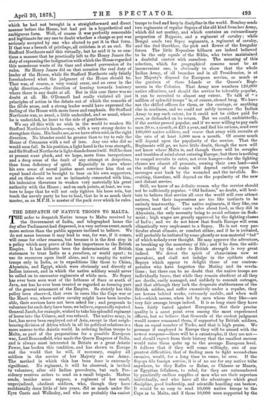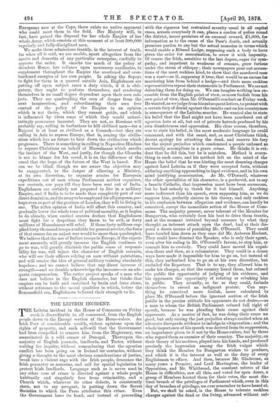THE DESPATCH OF NATIVE TROOPS TO MALTA.
THE order to despatch Native troops to Malta received by the Government of India, and telegraphed home the day after Parliament had dispersed, is a very serious event, much more serious than the public appears inclined to believe. We do not mean because it may lead to war, for war, if it comes, will come for other reasons, but because it is the first step in a policy which may prove of the last importance to the British Empire. It has hitherto been the determination of British statesmen to treat India as a peculium, or world apart ; to use its resources upon itself alone, and to employ its native troops only in India, or in expeditions like those to China, Abyssinia, and Egypt, which were obviously and directly of Indian interest, and in which the native soldiery would never be called on to encounter regiments of white men. No Sepoy has ever been seen west of the Isthmus of Suez or south of Java, nor has he ever been treated or regarded as forming part of the general armament of the Empire. So strictly has this policy been observed, that even in cases like the Cape war or the Maori war, where native cavalry might have been invalu- able, their services have not been asked for ; and proposals to volunteer for such duty have been, we believe, repeatedly rejected. General Jacob, for example, wished to take his splendid regiment of horse into the Crimea, and was refused. The native army, in fact, has never been employed out of Asia, except in that neigh- bouring division of Africa which in all its political relations is a mere annexe to the Asiatic world. In ordering Indian troops to Malta, as part of the preparations for a possible European war, Lord Beaconsfield, who made the Queen Empress of India, and is always most interested in Britain as a great Asiatic Power, has broken this tradition, and has shown to Europe and the world that he will, if necessary, employ all soldiers in the service of her Majesty as one Army. The method in which this has been done is extremely
significant. No regiment, it will be observed, is invited to volunteer, after old Indian precedents, but each Pre- sidency receives orders to send on a small brigade. Madras sends, besides some sappers, a regiment of her small, unprejudiced, obedient soldiers, who, though they have accidentally done little of late years, did so much under Sir Eyre Coote and Wellesley, and who are probably the easiest
troops to feed and keep in discipline in the world. Bombay sends two regiments of regular Sepoys of the old kind from her Army, which did not mutiny, and which contains an extraordinary proportion of Rajpoots, and a regiment of cavalry ; while Bengal sends two Sepoy regiments, a regiment of cavalry, and the 2nd Goorkhas, the pick and flower of the Irregular forces. The little Nepaulese hillmen are indeed believed to be the only equals of the Sikhs, who twice maintained a doubtful contest with ourselves. The meaning of this selection, which for geographical reasons must be an inconvenient one, is obviously to show that the whole Indian Army, of all branches and in all Presidencies, is at her Majesty's disposal for European service, as much as the garrison of these Islands or the Queen's Regi- ments in the Colonies. That Army now numbers 120,000 native effectives, and should the service be tolerably popular, it can be recruited to almost any extent. To talk of "a million of splendid troops" is, of course, absurd brag. We have not the skilled officers for them, or the carriage, or anything else in readiness, and we could not safely increase the Indian Army to any such extent, for it could not be either paid for ever, or disbanded on its return. But we could, undoubtedly, if the service proved popular, and if we were willing to pay each man 20 rs. a month, or £25 a year, and find his rations, send over 100,000 native soldiers, and renew that army with recruits at the rate of at least 5,000 men a month. Of course much will depend upon the popularity of the service. That the Regiments will go, we have little doubt, though the men will not know where Malta is, and though there will be scruples and troubles of mind about entering Europe; but there is nothing to compel recruits to enter, not even hunger—for the fighting classes are almost all peasants, owning their own land—and the refilling of the ranks will depend entirely upon the messages sent back by the wounded and the invalids. Re- cruiting, therefore, will depend on the popularity of the new and distant service.
Still, we know of no definite reason why the service should not be sufficiently popular. "Old Indians," no doubt, will hesi- tate to believe that service all over the world will ever attract natives, but their impressions are too like instincts to be entirely trustworthy. The native regiments, if they like, can suspend most of their caste rules about food, as they did in Abyssinia, the only necessity being to avoid reliance on flesh- meat ; high wages are greatly approved by the fighting classes of India ; and we do not know that South Europe will seem climatically very unpleasant to a Sepoy. He is not very par- ticular about climate, or comfort either, and if he is irritated, will probably be irritated by some ghostly or non-material "fad" of which nobody ever thought. He may approve the adventure, as breaking up the monotony of life ; and if he does, the addi- tion made by the order to British strength is very great indeed. We detest the spirit of chauvinism now so prevalent, and shall not indulge in the epithets about Sepoys which appear to delight those of our contem- poraries who have forgotten the Mutiny and its revela- tions; but there can be no doubt that the native troops are individually brave, that while they remain obedient at all they are docile, easily managed, and unlikely to commit outrages, and that although they lack the desperate stubbornness of the British soldier, and suffer excessively under a repulse, they are heroes behind works, extremely mobile, and when well
led—which means, when led by men whom they like—are very fair average troops indeed. It is so long since they have been fairly tested against Europeans, that their precise quality is a moot point even among the most experienced officers, but we believe that Generals of the coolest judgment would sooner command them, if supported by British soldiers, than an equal number of Turks, and that is high praise. We presume if employed in Europe they will be armed with the newest weapons—there will be a catastrophe, if they are not-- and should expect from their history that the smallest success would raise them quite up to the average European level. It follows that if they will come willingly, one of our greatest difficulties, that of finding men to fight second-class
enemies, would, for a long time to come, be over. If the Sepoys like foreign service, it is of no use for any native tribe
anywhere, be they Kafirs or Zulus, or Chinese or Maoris, or Egyptian fellaheen, to rebel, for they are outnumbered by practically endless supplies of men who are their superiors
individually, and who have all the advantages which good discipline, good leadership, and scientific handling can bestow. It would be as easy to send 10,000 native troops to the Cape as to Malta, and if those 10,000 were supported by the
Europeans now at the Cape, there exists no native opponent who could meet them in the field. Her Majesty will, in fact, have gained the disposal for her whole Empire of her whole Army, which consists at this moment of at least 300,000 regularly and fully-disciplined men.
We make these admissions frankly, in the interest of truth, for when all is said, we are unable, apart altogether from the merits and demerits of any particular enterprise, cordially to approve the order. It smacks too much of the policy of decadent Rome, her reliance upon mercenary auxiliaries, to supplement throughout the Empire the overtaxed and over- burdened energies of her own people. In asking the Sepoys to fight for them in a quarrel outside Asia, Englishmen are putting off upon subject races a duty which, if it is obli- gatory, they ought to perform themselves, and rendering themselves in no small degree dependent upon their own sub- jects. They are quadrupling the area of danger from the next insurrection, and subordinating their own free control of the policy of the Empire to an opinion which is not theirs, which they cannot guide, and which is influenced by ideas some of which they would unhesi- tatingly pronounce immoral. They are not, as Russians will probably say, calling in barbarians to kill civilised men—for a Rajpoot is at least as civilised as a Cossack—but they are calling in Asia to repress Europe, that is, arming the civilis- ation which has no future to beat down the civilisation which progresses. There is something in calling in Nepaulese Hindoos to repress Christians on behalf of Mussulmans which revolts the instinct of the West, and justly, for though the Ghoorka is not to blame for his creed, it is on the difference of the creed that the hope of the future of the West is based. Nor can we be blind, though we are aware the objection may be exaggerated, to the danger of allowing a Ministry, at its own discretion, to organise armies for European expeditions out of men whom Parliament neither organises, nor controls, nor pays till they have been sent out of India. Englishmen are certainly not prepared to live in a military Empire, and if India is to be made thus completely part of our direct dominion, and its army to be employed for all purposes, per- haps even as part of the garrison of London, they will be living in one. The reflex opinion of India will affect this country, and gradually lower the whole tone of political morality, as it begins to do already, when excited orators declare that Englishmen must fight for a despotism they know. to be evil, or forty millions of Mussulmans will rebel. If those forty millions sup- plied forty thousand troops available for general service, the force of that reason for an unjust war would be more than quadrupled. We believe that the use of Indian troops in Europe, if the experi- ment succeeds, will greatly increase the English readiness to go to war, will greatly diminish the public sense of responsi- bility for war, will injure the character of English recruits, who will see their officers relying on men without patriotism, and will render the idea of general military training absolutely hopeless ; and we cannot believe that any direct increase of strength—and we frankly acknowledge the increase—is an ade- quate compensation. The entire project speaks of a man who does not believe in the English character, but thinks that empires can be built and sustained by brain and force alone, without reference to the moral qualities in which, before the Beaconsfield era, Englishmen believed their strength to lie.



































 Previous page
Previous page